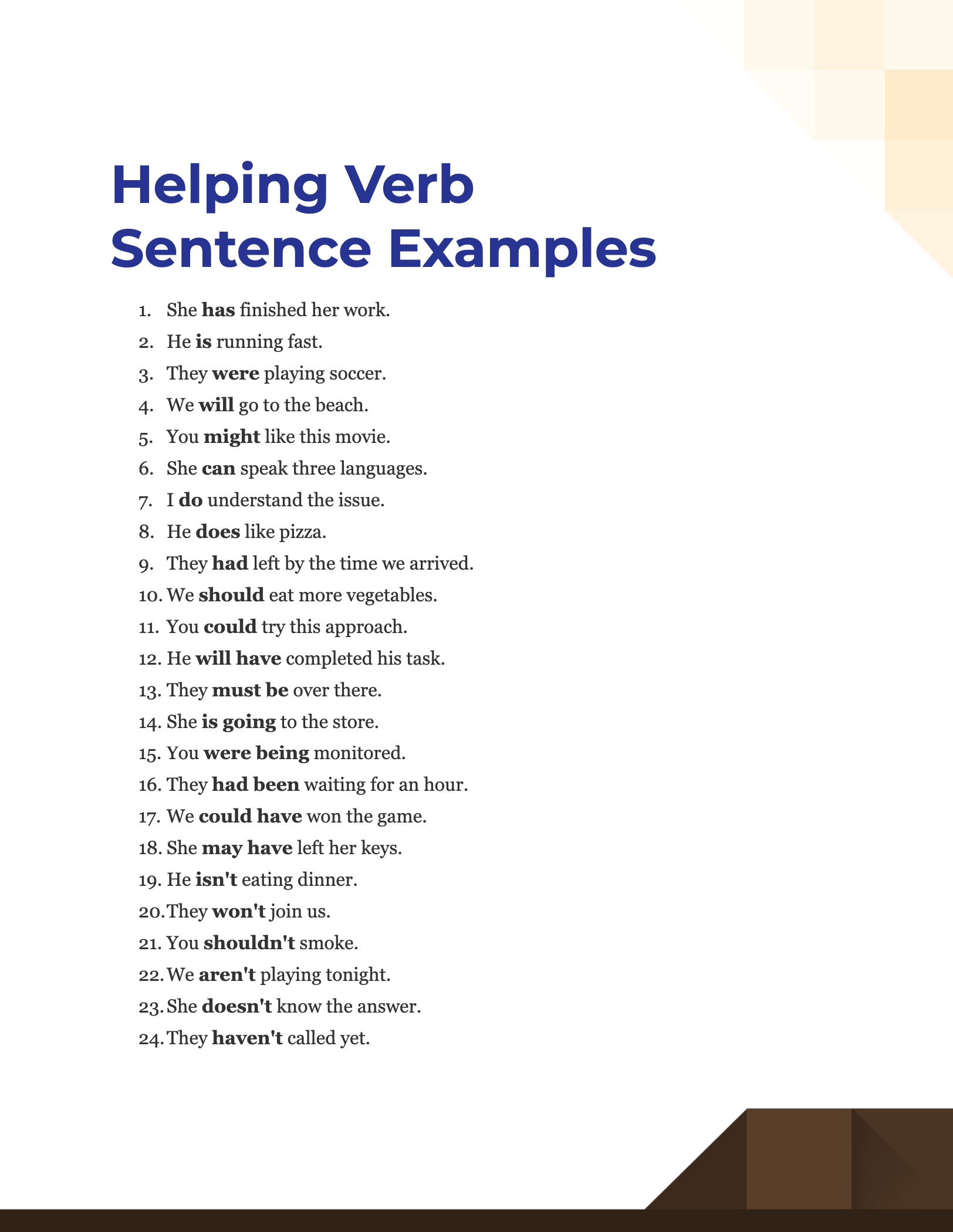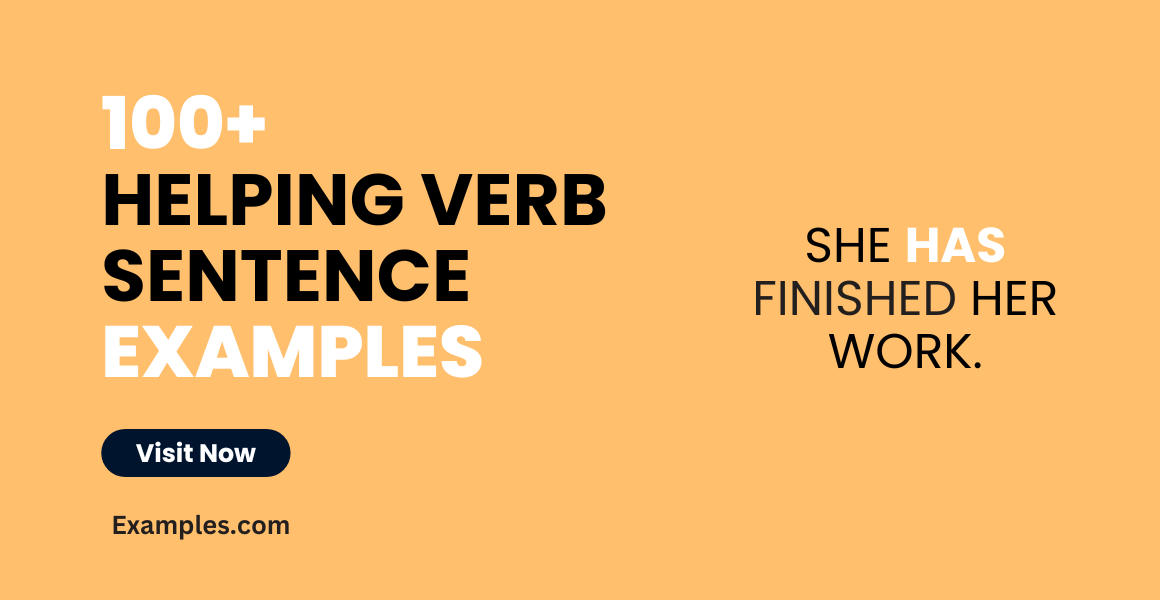99+ Helping Verb Sentence Examples
Helping verbs are the unsung heroes of impactful sentences. They add nuance, indicate tense, and give depth to your writing. Whether you’re a student aiming to ace your exams or a professional writer looking to enhance your style, this comprehensive guide on helping verb sentences is your go-to resource. We offer a treasure trove of sentence examples, detailed explanations, and invaluable tips to improve your writing.
What is the Helping Verb in a Sentence? – Definition
A helping verb, also known as an auxiliary verb, is a verb that accompanies the main verb in a sentence to provide additional meaning or to indicate tense. Unlike main verbs, helping verbs don’t convey action but lend support to the main verb to form different tenses, voices, or moods.
What is the best Example of a Helping Verb Sentence?
The sentence “She has been singing for three hours” is an excellent example of a helping verb sentence. Here, ‘has’ and ‘been’ are the helping verbs that assist the main verb ‘singing’ to indicate the present perfect continuous tense, thereby providing a more detailed time aspect to the action.
100 Helping Verb Sentence Usage Examples

Dive into the multifaceted world of helping verbs to elevate your writing skills. These auxiliary verbs, ranging from “be” to “have” and “do,” add depth to the main action by showcasing tense, mood, and voice. Master their usage to create compelling narratives, emphasize actions, and clarify your sentences.
- She has finished her work.
- He is running fast.
- They were playing soccer.
- We will go to the beach.
- You might like this movie.
- She can speak three languages.
- I do understand the issue.
- He does like pizza.
- They had left by the time we arrived.
- We should eat more vegetables.
- You could try this approach.
- He will have completed his task.
- They must be over there.
- She is going to the store.
- You were being monitored.
- They had been waiting for an hour.
- We could have won the game.
- She may have left her keys.
- He isn’t eating dinner.
- They won’t join us.
- You shouldn’t smoke.
- We aren’t playing tonight.
- She doesn’t know the answer.
- They haven’t called yet.
- He mustn’t forget his wallet.
- I will not participate.
- They have been learning German.
- You are being too loud.
- He was being rude.
- We will have been traveling for 8 hours.
- She might have been studying.
- You should have been there.
- He could have been a teacher.
- They did not try hard.
- We does not play baseball.
- You have to do your homework.
- She would like some coffee.
- He is to be blamed.
- They used to live here.
- We ought to be careful.
- You need not worry.
- He dare not say anything.
- She will be coming soon.
- They should be arriving now.
- We might be lost.
- You can’t be serious.
- I may be late.
- He won’t be going.
- They shouldn’t be talking.
- We can’t have forgotten.
- You might have known.
- He must have seen it.
- She can have done it.
- They won’t have arrived.
- We shouldn’t have waited.
- You can’t have seen him.
- He may have forgotten.
- They might not have known.
- She must not have told them.
- We wouldn’t have noticed.
- You couldn’t have guessed.
- He shouldn’t have lied.
- They can’t have left.
- She won’t have heard us.
- We must have been mistaken.
- You would have enjoyed it.
- He could have told me.
- They might have called.
- She should have known better.
- We will have to see.
- You shall have to decide.
- He will be having lunch.
- They should be having fun.
- She might be having doubts.
- We can be having a meeting.
- You will have been having a good time.
- He shall have been having trouble.
- They should have been having a party.
- She might have been having issues.
- We could have been having a blast.
- You ought to have been having fun.
- He mustn’t have been having any idea.
- They couldn’t have been having an argument.
- She wouldn’t have been having second thoughts.
- We shouldn’t have been having this discussion.
- You mightn’t have been having any clue.
- He has to have been having difficulties.
- They dared to have been having a secret plan.
- She used to have been having doubts.
- We will be able to have been having a party.
- You might possibly have been having regrets.
- He can’t possibly have been having that much fun.
- They would likely have been having a good time.
- She could likely have been having a tough day.
- We shall likely have been having a meeting.
- You may possibly have been having concerns.
- He will necessarily have been having second thoughts.
- They must inevitably have been having a chat.
- She ought definitely to have been having her way.
- We can undoubtedly have been having a ball.
Helping Verb Examples in Negative Sentence
Utilize negative sentences with helping verbs to negate actions or states effectively. These sentences are especially useful to express denial, contradiction, or absence in your writing. Learn how to structure them seamlessly in everyday conversations and formal writing alike.
- She has not visited Paris.
- He isn’t feeling well.
- They can’t solve the puzzle.
- We won’t go to the party.
- You shouldn’t skip meals.
- He doesn’t like coffee.
- They haven’t been to Italy.
- You mustn’t touch the artwork.
- She wasn’t at home yesterday.
- I will not be attending the conference.
Helping Verb Sentence Examples with Being
The word ‘being’ serves as a multifunctional helping verb to indicate continuous tenses and passive voices. Mastering its use can enhance the depth and clarity of your sentences, making your narratives more engaging and comprehensive.
- He is being honest with you.
- They are being recruited for the team.
- The cake is being baked now.
- She was being interviewed when I arrived.
- You are being very helpful.
- The report is being written.
- She was being careless.
- The project is being managed by Tom.
- The book was being read by the teacher.
- They are being affected by the new policy.
Helping Verb Sentence Examples for Class 2
For Class 2 students, helping verb sentences can be simple yet educational. Check out these examples to understand how helping verbs are used in elementary writing.
- She is jumping.
- He was sleeping.
- We are eating.
- You can do it.
- They will play.
Helping Verb Sentence Examples for Class 3
For Class 3, the complexity can be slightly elevated to help students understand the concept better.
- He should visit the doctor.
- She has sung the anthem.
- You might win the race.
- We have done our chores.
- They were talking loudly.
Helping Verb Sentence Examples for Class 4
For Class 4 students, helping verb sentences can be a bit more intricate, allowing for a deeper understanding of the English language.
- She could write a poem.
- He must complete the task.
- You would like the gift.
- We shall overcome the difficulty.
- They might attend the meeting.
Helping Verb Sentence Examples for Class 5
Class 5 students can benefit from more complex structures that challenge their understanding while strengthening their writing skills.
- He has been studying hard.
- She would have called you.
- They could have won.
- You should have told me.
- We will have finished by then.
What is the Structure of Helping Verb Sentences?
The structure of a helping verb sentence generally follows the pattern: [Subject + Helping Verb + Main Verb + Object]. The helping verb comes immediately before the main verb.
How do you write Helping Verb Sentences? – Step by Step Guide
Writing sentences with helping verbs (also known as auxiliary verbs) can give your writing depth, nuance, and clarity. These verbs assist the main verb in conveying aspects like tense, voice, or mood. If you’re looking to master this skill, here’s a step-by-step guide that will have you crafting intricate sentences in no time.
Step 1: Identify the Main Verb
The first step is to decide the main action or state you want to express in your sentence. The main verb represents this action or state.
Step 2: Determine the Tense, Mood, or Voice
Helping verbs are instrumental in indicating the tense (past, present, future), mood (indicative, imperative, subjunctive), or voice (active, passive) of the main verb. Choose what aspect you want to emphasize.
Step 3: Choose the Appropriate Helping Verb
Different helping verbs are suitable for different situations. For instance, “have” and “been” are generally used to form perfect tenses, while “will” and “shall” are used for future tenses.
Step 4: Formulate the Sentence
Combine the helping verb(s) with the main verb to formulate the complete sentence. Ensure that the helping verb is appropriate for the subject in terms of number (singular/plural) and person (first, second, third).
Step 5: Review and Edit
Once the sentence is written, review it to ensure that it effectively conveys the intended meaning and that the helping verb complements the main verb appropriately.
Example:
- Main Verb: Go
- Tense, Mood, Voice: Future, Indicative, Active
- Helping Verb: Will
- Sentence: She will go to the store.
Tips for Using Helping Verb Sentences
- Keep It Simple: Though helping verbs add complexity, it’s essential to avoid overcrowding your sentence with multiple auxiliaries unless necessary.
- Be Consistent: When writing, keep the tense and mood consistent throughout your sentences to provide a smooth reading experience.
- Know Your Helping Verbs: The most commonly used helping verbs include “be,” “have,” “do,” “can,” “could,” “may,” “might,” “shall,” “should,” “will,” and “would.” Make sure you know how each one functions.
- Context Matters: The choice of helping verb can alter the meaning of a sentence, so ensure you select one that fits the situation or message you want to convey.
- Check Subject-Verb Agreement: Ensure that the helping verb agrees with the subject in number and person. For example, “She is going” is correct, while “She are going” is incorrect.
- Mind the Order: When using more than one helping verb, be mindful of their order. For example, in the sentence “She has been running,” “has” comes before “been.”
- Use Modals for Probability and Ability: Modal helping verbs like “can,” “could,” “shall,” “should,” “will,” “would,” “may,” “might,” and “must” can express probability or ability.
- Avoid Redundancies: Be cautious not to use helping verbs redundantly. Sentences like “I did went” should be avoided.
- Practice Makes Perfect: The more you practice, the better you’ll get at integrating helping verbs into your sentences naturally and appropriately.
By incorporating these steps and tips into your writing routine, you’ll be able to construct sentences that are not only grammatically correct but also rich in meaning and style.



